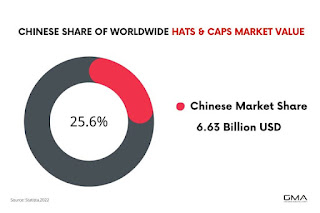The Chinese Hats & Caps market value is HUGE
The market's value is the most important thing to consider when you are looking to enter a market. How important is the market? Is it big enough to support so many other competitors? Statista estimates that the Chinese caps and hats market will reach 6.63 billion USD in 2022. Comparable to the worldwide hats & caps market of 25.87 billion USD. The Chinese market currently takes 25.6% global hats & caps market.
China's Hats & Caps Market: Men, Women and Children
Who is the primary audience for hat products in China and who are their main competitors? The market for women's caps and hats in China is expected to reach 3.37 billion dollars by 2022. This represents 50.8% of China's total market. In 2022, the women's market for hats and caps accounted for 2.45 billion and 0.81 million USD respectively. 36.9% and 12.2% respective of the market share. The women's market for hats will continue to be the largest in China until 2022.
Chinese customers are more willing to buy hats online
Chinese customers are more likely to shop online than they do offline because of China's advanced e-commerce. Online sales of caps and hats for children, women, and men will account for 58.7%, 59% and 60.4% respectively of their market values in 2022. In comparison to the global market which has 35.2%, 35% and 32% online sales respectively, brands should place more emphasis on China's online sales.
Guess Which Hats Are More Expensive On Average? Men's!
The market volume for hats and caps in 2022 will be 1039.7, 505.3 and 465.3 million, respectively. If you calculate their market value, it might be that the average price for men's caps and hats is 4.85 USD. However, the average price for women's caps and caps are 3.24 USD and 0.3 USD. While the market for women's caps is growing faster than that of men's, Chinese men are purchasing more expensive hats.
What are the Trends in China? What is emerging?
Street wear leading to the rise of the Fisherman Hat
Chinese fashion-lovers of the younger generation (Gen Z), are more focused on the fisherman's hat. Many fashion youths in China are now willing to wear street clothes because of the rise in hip-hop. They have made it a popular choice to express their taste and find like-minded people by wearing street clothes. Inadvertently, they will highlight certain details in outfits through their choice of accessories or clothing. Fisherman hats have enjoyed a rising popularity. The winter of 2022 saw a 58.1% increase in the number of searches for fisherman's hats on Douyin. Fisherman hats have become a symbol for fashion and are no longer considered outdoor headwear.




